- Home
- Why Choose Us
Asia’s Leading Drug and Alcohol Rehab Centre
A Peaceful Riverside Sanctuary in Chiang Mai, Thailand

Located in picturesque Chiang Mai, The Dawn is Asia’s premier residential rehab, offering separate programmes for mental health and addiction treatment.
We promote mental, physical, and spiritual healing through a unique blend of highly effective Western psychotherapeutic techniques and Eastern wellness practices, all delivered with world-famous Thai hospitality.
During our intensive, personalised treatment programmes, clients participate in therapeutically powerful group sessions, individual therapy, and wellness activities including fitness classes, yoga, and massage therapy. Your health and wellbeing are our highest priority.
At The Dawn’s Asia rehab centre, you can fully focus on your recovery journey. We provide comprehensive support and guidance to nurture a healthy mind, body, and soul.
Explore why people choose The Dawn for their recovery journey:
Why Our Clients Choose Us
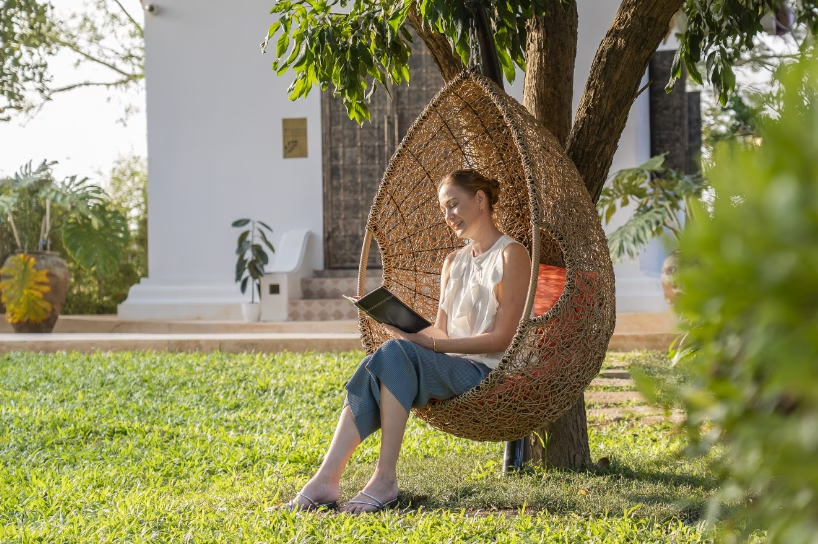
Far from Triggers and Stressors
Our secluded riverfront property on the outskirts of Thailand’s Northern capital, Chiang Mai, is a world away from the people, places and situations that contribute to your condition. You will be enveloped in a sense of calm and safety from the moment you set foot in our peaceful centre with its lush green lawns and friendly, caring team.
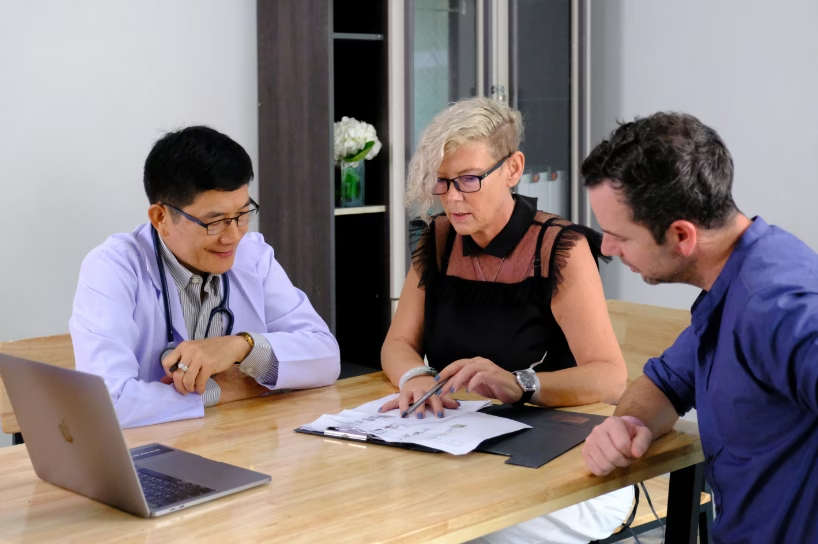
International Accreditation
We are the only Asia-Pacific rehab and mental health treatment facility with international accreditation by the Commission on Accreditation of Rehabilitation Facilities (CARF International), a mark of high quality treatment centres in America. This means our treatment services adhere to global best-practices in terms of quality and patient-safety from clinical, medical and environmental perspectives. We are committed to upholding CARF standards through annual audits.

Our Treatment
Approach

Personalised
Treatment
We understand that every person is unique and in need of personalised treatment, guidance, and care. With this in mind, our dedicated therapists aim to create treatment plans that are specifically suited for each client. We want to ensure that every client receives the right balance of treatment, relaxation, and wellness.

24 Hour
Medical Support
We have a 24-hour professional nursing team onsite who have vast experience in handling detox as well as patients with psychological issues. They monitor and assist clients as required under the supervision of our psychiatrist who handles all medication prescription.
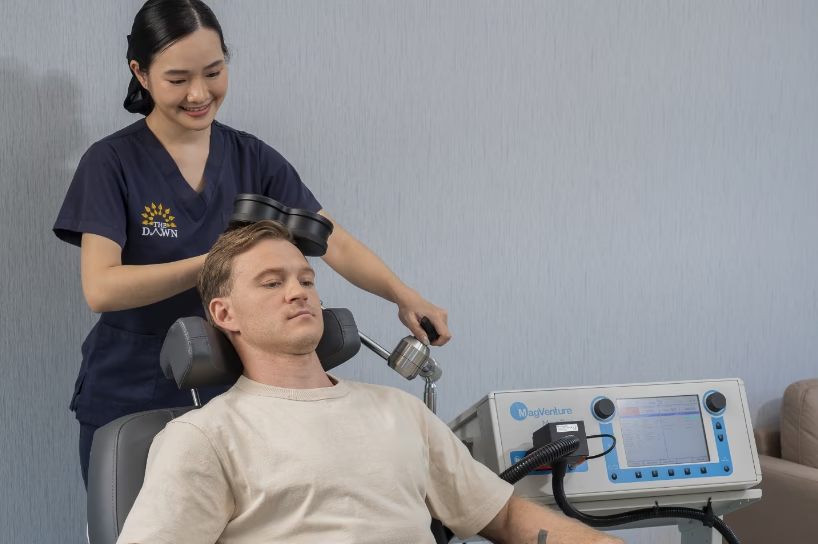
TMS – Cutting Edge Treatment
The Dawn is the only mental health and rehab in Asia offering the innovative Transcranial Magnetic Stimulation treatment or TMS – an FDA approved, non-invasive technology that helps in the treatment of depression and anxiety related disorders. TMS is exceptionally effective in individuals who are resistant to normal depression medication. Moreover, TMS treatment does not have the unpleasant side effects associated with many depression medications.

Trauma
Programme
In our Trauma Programme, we delve into and address the underlying causes of your addiction or mental health condition. We utilise a personalised, trauma-informed approach through evidence-based therapies such as TF-CBT, EMDR, exposure therapy, and somatic techniques to achieve true recovery.
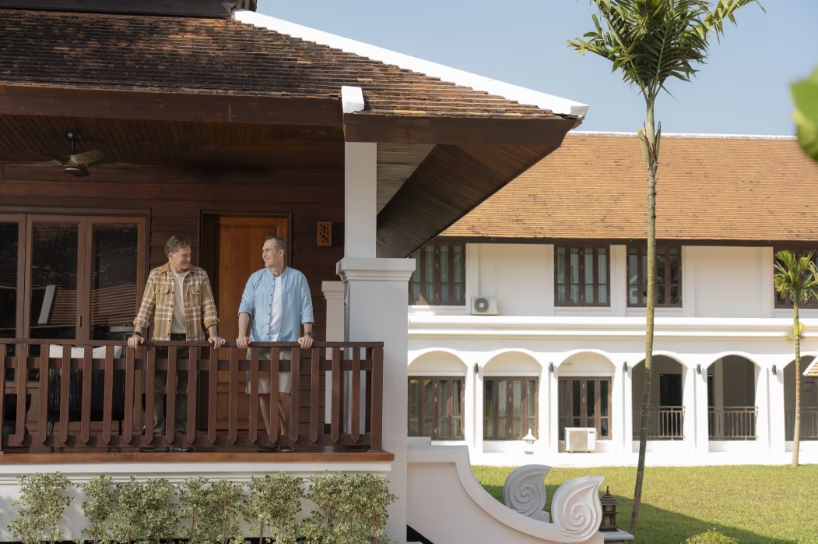
Aftercare
Support
The Dawn offers structured online aftercare support to provide clients with guidance and support once they are home. These group therapy sessions are held at a convenient time for our clients in US, UK and Australian time zones.
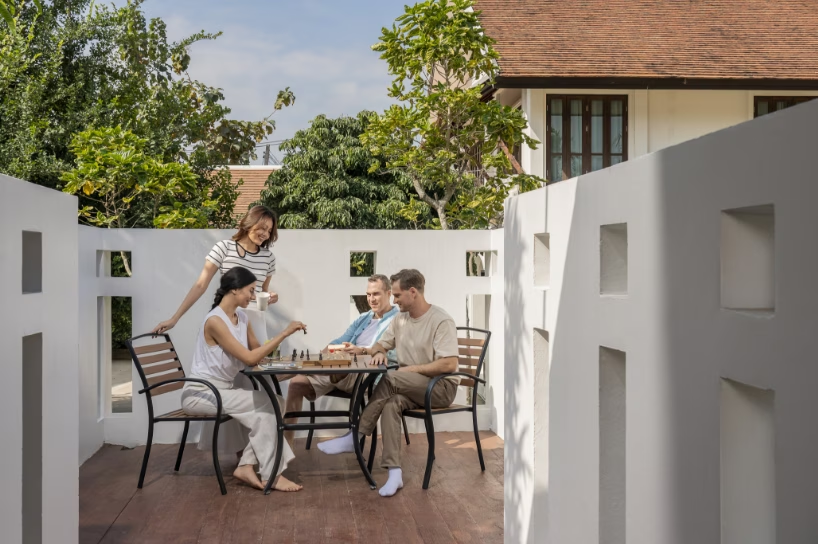
Addiction Relapse Warranty
We offer an Addiction Relapse Warranty for clients who complete 12 weeks of treatment for alcohol and drug addiction – if you relapse within 12 months you can return to The Dawn for 28 days of treatment at no additional cost.
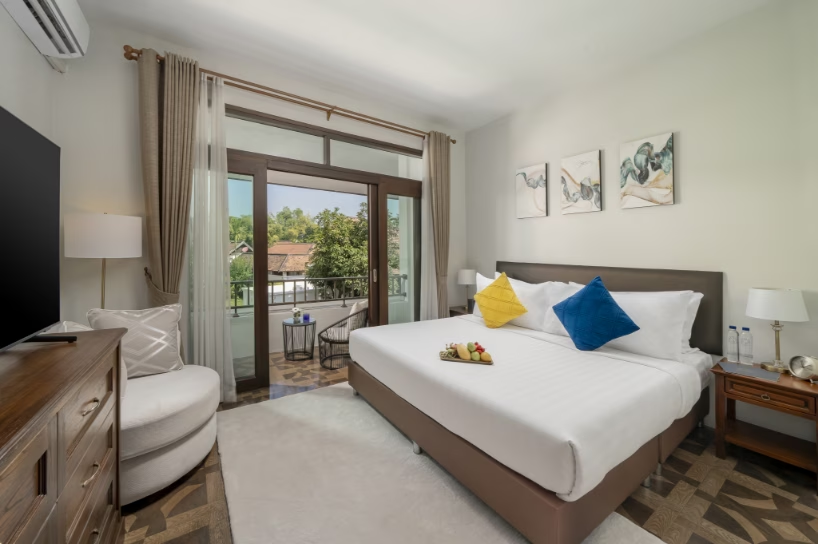
Private Rooms
Every client gets their own private room with an ensuite bathroom, WiFi, and a full range of amenities in a resort style setting. The Dawn Rehab in Thailand offers a wonderfully peaceful sanctuary in which to relax and heal your mind, body, and soul.
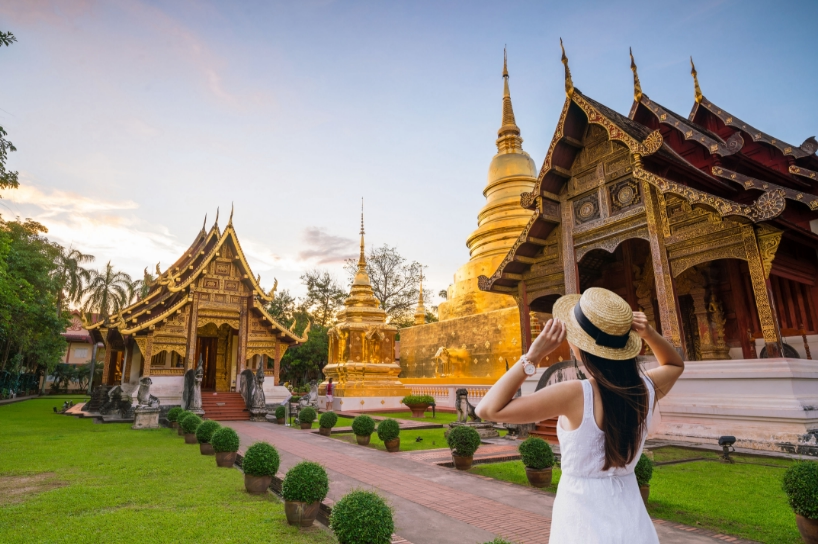
Weekly Outings
Weekly excursions are offered to clients so they can experience the cultural and beauty of nearby attractions in Chiang Mai. Outdoor activities include temple visits, bike riding through rice fields, a visit to the elephant sanctuary and more.
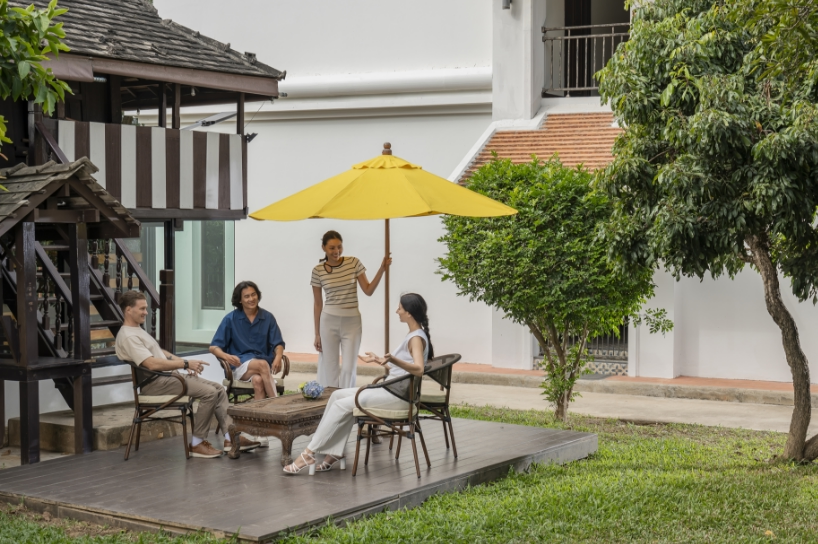
Affordability
Due to the lower drug rehab Thailand cost of living in South East Asia compared to the West, The Dawn’s high-quality, all-inclusive inpatient treatment programmes cost less than half the price of similar standard treatment centres in Australia, the USA and the UK.
START YOUR RECOVERY JOURNEY TODAY WITH A FREE ASSESSMENT
Rehab Programmes Available at The Dawn Asia
Our Asia rehab centre has carefully designed treatment and drug detoxification programmes for all major addictions, co-occurring disorders, and mental health issues. All programmes include individual therapy and 24/7 support. Highlighted below are our most requested treatments.
Alcohol Rehab
Alcohol rehab with structured treatment to stop drinking and rebuild stability. Learn more.
Prescription Drug Rehab
Safe medically-assisted detox and addiction therapy for opioids and benzos. Learn more.
Mental Health Retreat
Residential care for emotional breakdowns, burnout, and acute distress. Learn more.
Depression Retreat
Intensive treatment for depression when outpatient care is not enough.
Learn more.
TAKE THE FIRST STEP TO RECOVERY TODAY
Why Choose Asia for Rehab
The Dawn
USA
UK
Medically supervised detox
World-class clinicians
Treatment of co-occurring disorders
CARF accreditation
Dedicated trauma programme
1/3rd price for comparable quality
Escape triggers far from home
The Dawn
USA
UK
Medically supervised detox
World-class clinicians
Treatment of co-occurring disorders
CARF accreditation
Dedicated trauma programme
Escape triggers far from home
1/3rd price for comparable quality
Why The Dawn is Your Best Choice for a Thailand Rehab Centre
94%
of our clients would recommend
The Dawn to their family and friends
81%
of our clients rate the quality
of treatment as excellent
Why The Dawn is Your Best choice for a Rehab Centre in Asia
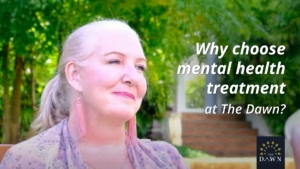
Christine’s Story: Finding Clarity and Calm at The Dawn
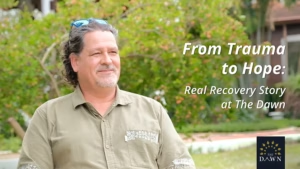
Holger’s Journey: Healing from Trauma at The Dawn

Paul’s Experience: What Rehab at The Dawn Really Feels Like
Supported Transition Back to Daily Life
The transition from the safety of a treatment centre back to daily life is often the most challenging phase of recovery. During this time, you are at your most vulnerable.
Free Lifetime Aftercare Support
We provide ongoing support through biweekly online group sessions, and alumni events. Learn more.
Step Down Programme
For those who would like to consolidate their recovery further before returning home, our Step Down Programme provides a supportive bridge between intensive treatment and independent living. You will live on-site with freedom to come and go, practicing recovery skills while maintaining facility security. Learn more.
Alumni Programme
Join our global alumni network for continued peer support, access to recovery resources, and connection with The Dawn’s expertise wherever you are.
Relapse Warranty
We are confident that our high quality of treatment and your personal growth combined with the coping skills you will accumulate while in treatment will prepare you for a life of sobriety. As the top drug and alcohol rehab in Thailand, The Dawn offers a rare Addiction Relapse Warranty policy, which ensures that anyone who completes 12 weeks of treatment for drug or alcohol addiction can come back for an additional 28 days of residential treatment, at no additional cost, if they relapse within one year.
Standards You Can Trust
We are proud members of these major international addiction associations, reflecting our commitment to ethical, evidence-based treatment and continuous improvement.

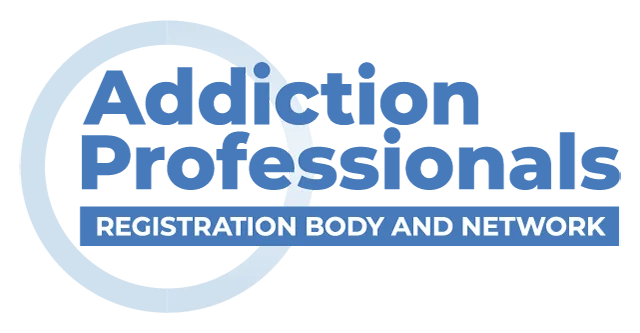

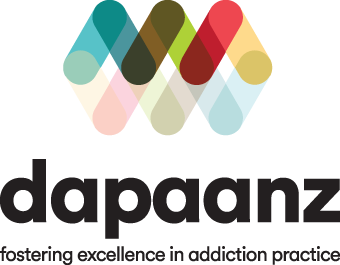
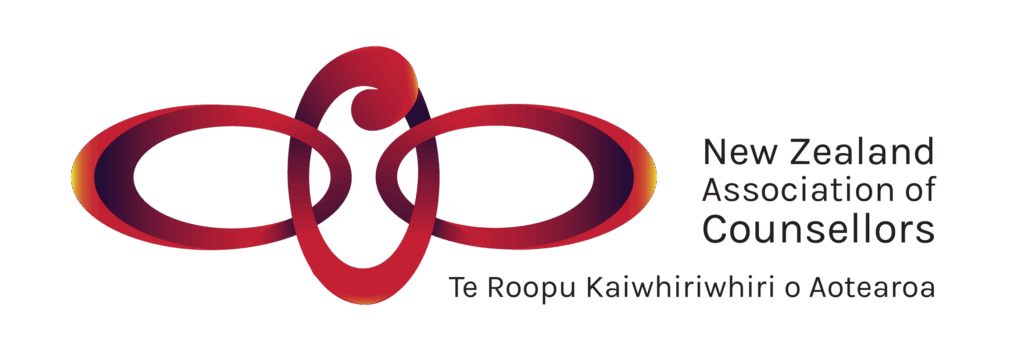
Frequently Asked
Why do people go to Asia for rehab?
−Many people choose rehab in Asia for its mix of affordability, quality, and privacy. Treatment costs are often far lower than in the US, UK, or Australia, yet many centres are staffed by internationally trained professionals.
Being far from home offers anonymity and distance from triggers, while tropical settings and resort-style facilities create a calming environment. Programmes often blend evidence-based therapy with local practices like meditation, yoga, and massage. Shorter wait times also make Asia an attractive option for those seeking immediate help.
How much does rehab in Asia cost?
+Rehab costs in Asia vary depending on the level of care and the quality of the programme. Most centres charge between $6,000 and $20,000, but what you get for that price can be very different. At The Dawn, we offer full clinical care, experienced staff, and a luxury peaceful, private setting, for a fraction of what you would pay at similar centres in the West.
Here is what makes us different:
- We are the only CARF-accredited rehab in Asia
- We offer personalised treatment plans as well as a signature Trauma Programme
- 24/7 medical care and onsite detox means you are safe from day one
- You stay in resort-style accommodation, designed for rest and recovery
- You get genuine, one-to-one support from a team that is with you every step
What is the recovery success rate at The Dawn?
+We maintain a 90% programme completion rate, with 88% of clients reporting significant improvements in their quality of life. Additionally, 96% of our alumni would recommend The Dawn to others. Our comprehensive approach, including trauma therapy and lifetime aftercare support, contributes to these strong outcomes compared to traditional models.
